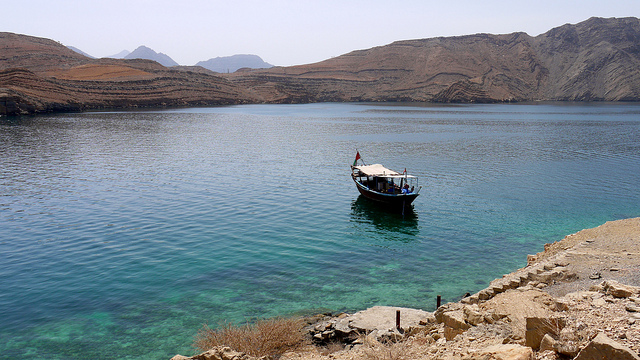
By Marian Crotty
We wanted to see the Iranian men bouncing toward us in fiberglass speedboats, racing past military ships and oil tankers to exchange smuggled goats for televisions. We wanted to know these secrets and gloat with the safety afforded to tourists. We wanted to stare for a weekend and then drive home.
This was the Omani exclave, Musandam, a small peninsula of craggy coastlines and drowned mountains along the Strait of Hormuz. Hulks of pale yellow and ochre rock thrust up through bright water; flinted peaks clouded with thick gray haze; hillsides flecked with iron and copper glimmered in the sunlight. In the shallow water closest to the shoreline, the ocean faded gold-blue.
At our hotel, blonde German children splashed each other in the pool while hijabi women rotated between an ongoing indoor buffet and the plastic lounge chairs by the pool deck. There was not a lot to do in the direct sunlight, which was, in late spring, blinding. No real beaches but those for fishing, no sightseeing options save for the main road that had brought us here.
Musandam was simple beauty: air and water, mountains and sand, but we wound through it in wearied silence.
We lived four hours south in the United Arab Emirates, in the city of Al Ain. We drove along a smooth highway lined with silver guardrails and red sand, past Dubai’s skyscrapers, past a vacant stretch of shrub-strewn desert, and north into the free trade zones. Wide highways splintered into slag heaps and smokestacks, metal factory chutes yawned over traffic; the industry that always hung in the air of the Emirates swallowed the landscape. Glass and ceramics factories sprawled across the mudflats. Palatial two-story homes, with bay windows and three-car garages, shared lots with cylindrical crude oil tanks. The road was snarled with debris and gravel thrown from heavy trucks. Past the Omani border, when the crush of machinery dissolved into turquoise seascapes and towering slabs of limestone, our muscles stayed coiled with the tension of the drive behind us. Musandam was simple beauty: air and water, mountains and sand, but we wound through it in wearied silence.
In town we found heat, sunburn, mosques, a fort, tour companies offering diving lessons and boat rides, and souks selling dust-rimed soap and canned goods.
A middle-aged man missing most of his teeth offered to sell us a boat ride in a blue speedboat, already crowded with men playing cards and drinking tea from Styrofoam cups. “Look,” he said. “A very fast boat.”
“No thank you,” we said, and he lowered the price.
“With the men inside?”
He nodded.
“Too hot,” we said and pointed to the sun.
At night workers poured into the square, blanketing the sidewalks and parking lots, and SUVs clustered along the cliffs. In the morning, we bought a boat cruise at the hotel desk and soon found ourselves on a cheap replication of a traditional wooden fishing vessel with a Scottish couple celebrating their fortieth anniversary. Our tour guide and captain were both from India, young men who spoke no Arabic and little English and took turns playing games on a cellphone.
We floated between blades of limestone, snapped pictures against the hum of the rudders, and watched the mountains pass like clouds. We saw tiny fishing villages in the distance, lean-tos propped up against rocks, clothes hung on rocks to dry. After a few hours the boat stopped and our tour guide clapped and keened until dolphins appeared. We jumped into the water and swam. We had reached Telegraph Island, the site of a British outpost built in the 1860s to oversee the construction of a transcontinental telegraph system, a network of wires laid upon the seafloor to connect England to the East. The rubble of the abandoned station blended into the rock—tiny yellow-orange bricks, disappearing stairs—and it was easy to mistake this place as native scenery.
It was easy to forget the Indian mutiny against the East India Trading Company, the English government’s wide-scale efforts to protect these investments, the reasons why transnational communication became suddenly necessary.
The wires were as imperceptible as ever, but the history was gone too. It was easy to forget the Indian mutiny against the East India Trading Company, the English government’s wide-scale efforts to protect these investments, the reasons why transnational communication became suddenly necessary. Later, we would discover that the German engineering company that had manufactured the telegraph 150 years ago, Siemens, had a long history of unflinching profit. This was a company that used the labor of enslaved Jews in Nazi Germany, a company whose nuclear equipment was still in use in Iran, and a company that, less than a decade ago, pled guilty to tendering billions in bribes to corrupt foreign officials. This was public information printed in mainstream newspapers, as exposed as the norms of production, the weight of trade sanctions, and the vigilant forces of empire. Underwater, along the old routes of the telegraph cables, fiber optics ran wireless signals between continents, insulated cables thicker than a human body, heavier than fences, invisible until a ship’s anchor, or the force of the earth itself shifting, broke them.
At the harbor, on the edge of a gravel parking lot, small docked boats held plastic storage containers and tired men who slouched away from the sun. We squinted at them, and they stared back with quick-waning interest. These were our smugglers: bored, restless, waiting for sunset.
Marian Crotty is a PhD candidate in fiction at Florida State University and a 2012-2013 Fulbright scholar to the United Arab Emirates. Her writing has appeared in journals such as Third Coast, Blackbird, and Michigan Quarterly Review and is forthcoming in the Southern Review.
